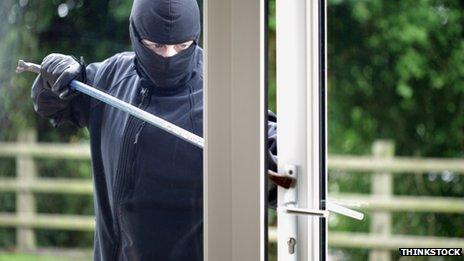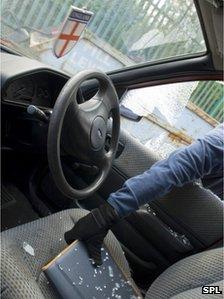Do voters really want to choose their police commissioner?
- Published
- comments

With less than 50 days to go until elections for the new police and crime commissioners (PCCs) in England and Wales, there is growing anxiety that one of the government's flagship criminal justice reforms resembles a slow-motion car crash.
The introduction of directly-elected commissioners was hailed by its Conservative architects as a vital step in "giving people democratic control over policing priorities".
But there are questions as to whether our democracy is really going to deliver on this promise.
The Electoral Reform Society (ERS), along with 20 PCC candidates, has now written to the Home Secretary Theresa May warning of an impending disaster.
"These elections are in serious danger of descending into a farce," said Katie Ghose, chief executive of the ERS. "If the home secretary is serious about people having a say she needs to listen to the warnings coming from all sides and take action now."
The signatories warn that turn-out in the elections, due to be held on 15 November, may well be the lowest in modern political history. Last month the ERS projected that only 18.5% of voters would participate.
Among the ERS demands is for the government to pledge "never to hold a major election in the winter again".
The Home Office hopes public excitement about the opportunity voters are being offered to hold the police accountable may build in the coming weeks. But in a speech earlier this month, the new Policing Minister Damian Green hinted at government concern about voter apathy.
"I know that I have a job to engage the public with the policy of PCCs over the next eight weeks in order to persuade people to get out and vote," he said. "I personally, together with other ministers, will be going around the country to talk to as many people about the benefits police and crime commissioners can bring and why they should go out and vote."
At the moment, though, it seems doubtful this exercise will be held up as a model of how to empower local communities.
The PCC areas are huge. Some commissioners will represent the interests of millions of people - an electorate far greater than any MP. If turn-out really is as low as predicted, what does it mean for democratic legitimacy? In a tight vote, some candidates may claim a mandate based on support from less than one in 10 of the local population.
I don't think it is the paucity of leaflets and national marketing that explains lack of public interest in PCC elections. Nor can the likely low turn-out just be blamed on autumnal chill and drizzle.
There is a more fundamental question - does the public really want the responsibility of selecting the best person to set police priorities in their area?
Among the fervent few who organise fringe events at party conferences, the democratic deficit represented by "unaccountable police authorities" may inspire tub-thumping rhetoric. But I have to say it has not been a subject much discussed at my bus stop.
People are worried about crime, of course. But in a developed democracy like ours, one gets the sense that voters expect others to worry about the minutiae of public service delivery. They realise, perhaps, that policing is a complex business and it is questionable whether the electorate believes it is well placed to judge who has the best ideas on resource allocation for, say, domestic violence against rural crime.

More police won't necessarily help
I may be wrong. When the arguments over police priorities start to be played out in the letters pages of local newspapers, on the doorsteps and in the pubs, perhaps we will get the thoughtful and realistic debate government ministers clearly hope to inspire.
But there is a concern that, actually, public discussion will be dominated by familiar simplistic refrains - the answer to crime is "bobbies on the beat" or "zero-tolerance" or simply "more police". (See my previous blog on whether bobbies on the beat really cut crime.)
Speaking to PCC candidates, Damian Green recently made the point that "manifestos need to be credible, evidence-led and show innovative thinking". And on Thursday Her Majesty's Inspectorate of Constabulary (HMIC) did its bit to try and prevent the elections turning into an arms-race of impractical promises.
It raises the questions it suspects voters are likely to ask and then provides the best evidence on what works to cut crime.
Q: Shouldn't we just have more bobbies on the beat?
A: Just having more people or responding more quickly to calls from the public does not necessarily reduce crime or reassure people. Patrolling on foot can reduce crime where it is targeted in crime hotspots.
Q: What about zero tolerance - isn't that how they reduced crime in New York?
A: The New York police chief at the time has said that zero tolerance does not describe what happened, and that community policing and an organisational focus on crime reduction and quality of life issues were key.
Q: Shouldn't we just employ more police to cut crime?
A: A recent review of the literature commissioned by HMIC concluded that there was not enough evidence to say that higher numbers of police officers was the direct cause of lower levels of crime, although extra officers have the potential to cut some forms of recorded crime.
Q: Doesn't fear of being caught stop the criminals?
A: Recent survey research from the UK showed that the risk of being caught and punished was linked to lower levels of reported traffic offending (like speeding) but not other minor crime. For prolific offenders, the fear of being caught can reduce crime when combined with support interventions.
This idea is to help inform a more nuanced and sophisticated debate about police and crime. The HMIC sums up its conclusion saying that "focusing action on crime and anti-social behaviour hotspots, repeat victims, and prolific or high volume offenders is, therefore, an effective way to allocate resources for crime reduction".
It also makes the point that police officers charging around trying to look tough may well prove counter-productive. "By treating people equally, making decisions fairly, explaining them and being respectful, the police can encourage people to cooperate with them and not break the law."
I wonder, though, whether voters will brave the wind and the wet on 15 November to register their support for candidates who say they don't support more "bobbies on the beat", that zero tolerance is a myth, that resources should be skewed towards the poorer high-crime areas and that they want their officers to be nicer to people.